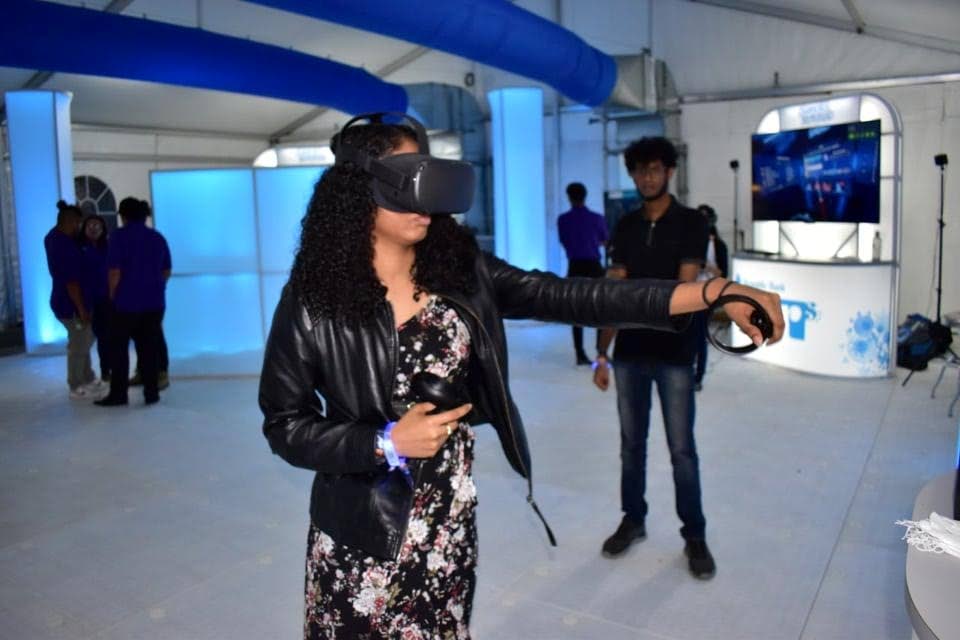The Future is ICT

Heads up humans: robotics is where the world is heading. That is what the American Chamber of Commerce TT (Amcham) believes.
In a statement to Newsday, Amcham said it believes many jobs will eventually become automated. “We are going to propose that the government starts incorporating things like coding from as early as primary school. The future is ICT (information and communications technology),” the statement said.
Amcham said its desire is to see successful programmers and data coders developed by universities in TT and it encourages students to get involved in ICT and develop their knowledge of technology. According to Amcham, the fields that will be in high demand in the future are animation, robotics, data science and mobile software.
Someone who shares the same sentiment is Aneillio Brazzier, CariGamers PR manager and Gaming Association of TT vice chairman. Though he thinks gaming in TT is underdeveloped, Brazzier believes gaming and virtual reality (VR) will become more viable as time goes on.
“There isn’t sufficient infrastructure to facilitate gaming seriously in TT. There aren’t enough eSports tournaments and not enough tournaments backed by corporations,” he told Newsday. However, compared to 20 years ago, he believes it’s a lot more feasible for persons to pursue careers and opportunities in the VR and gaming industries. He said, “It’s easily becoming an option. People have the option of gaming from the comfort of their home, like YouTube gamers. It’s becoming easier to monetise it.”
Asked if he thinks VR will integrate itself into the workplace, Brazzier said it’s not a matter of if, but when. “VR is already an integral part of the workplace. It’s taking the risk factors out of certain jobs and it can be used to propel innovation and technology forward. So instead of asking if, it’s a matter of when it will take over and I think that can happen as soon as 2030,” he said, “It’s soon going to become a part of everyday life.”
He added that VR can be used for simulations and is currently being tested internationally as a therapeutic and learning tool for children diagnosed with autism, attention deficit disorder (ADD) and attention-deficit/hyperactivity disorder (ADHD). “VR can be used to screen your senses. So using VR, you can get the child to focus on what they have to get done and what’s in front of them,” he said.
“It’s a relatively new discovery and it’s still in the trial phase so they’re testing it before they open treatment centres... but it’s showing great results for autism and that’s the goal at the end of the day – to help the child,” he said.
He explained that this new VR automated treatment will be able to be used with almost any device and can help with catering to autistic children who may need to have things suited to their environment.
For students interested in pursuing a career in ICT or VR, Brazzier advises them to still pursue those careers. He said, “The programmes in UWI and UTT are really strong and the teachers are versatile. They shouldn’t use Trinidad as an excuse. They should just go for it.”
On the other side of the control, Chairman of the Regency Recruitment and Resources Lara Quentrall-Thomas said she has not seen many changes in the present job market. She said, “We’re seeing requests for a lot of administrative and logistical jobs. Companies are seeking employees for HR (human resource) related work, even with state boards and agencies.”
However, she said many university students face different challenges and have unrealistic expectations when preparing to enter the presently “slow” job market.
“Students have unrealistic expectations particularly for salaries. They need to be open and flexible concerning salaries and compensation for starting jobs and entry level positions,” she said. She also believes students should understand the need to build experience before they earn their dream salaries. “They will be offered short term, temporary or contract jobs, many times with no benefits especially in the first years of their career.”
In light of the rise of ICT in the workplace, Quentrall-Thomas advises students to enhance their computer skills as well as their communication skills. “We still see young people with some terrible résumés,” she said. She urged students to also remember the importance of volunteerism, adding that employers do take interest in extra-curricular activities and want to see that a student did more than just study.
Asked whether she thinks the job market will change, Quentrall-Thomas said she hopes that more sustainable and long-term jobs are created because there currently aren’t enough. She said that even though the election season stimulates the economy and fosters job creation, many of those jobs are not sustainable or long-term.

Comments
"The Future is ICT"